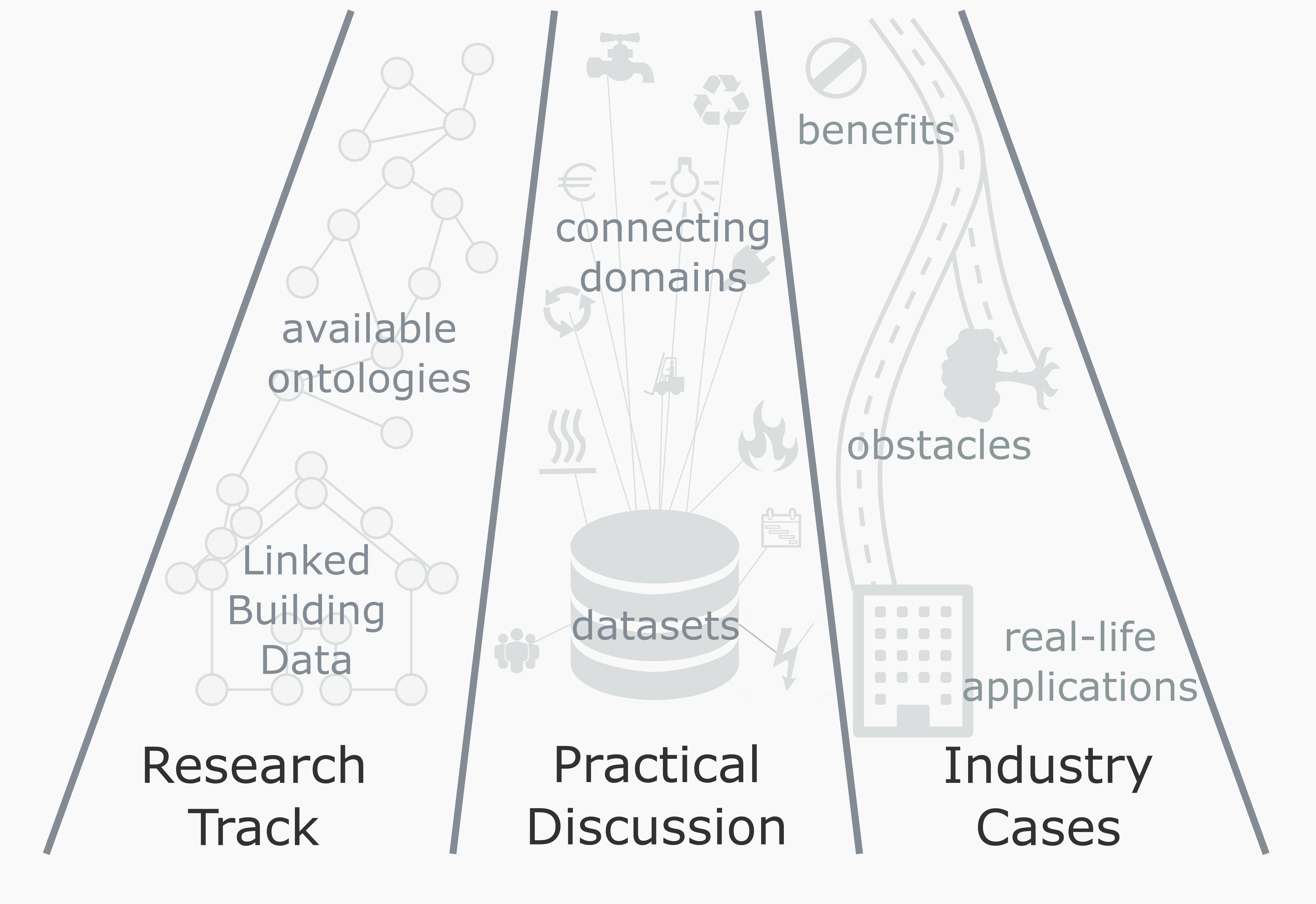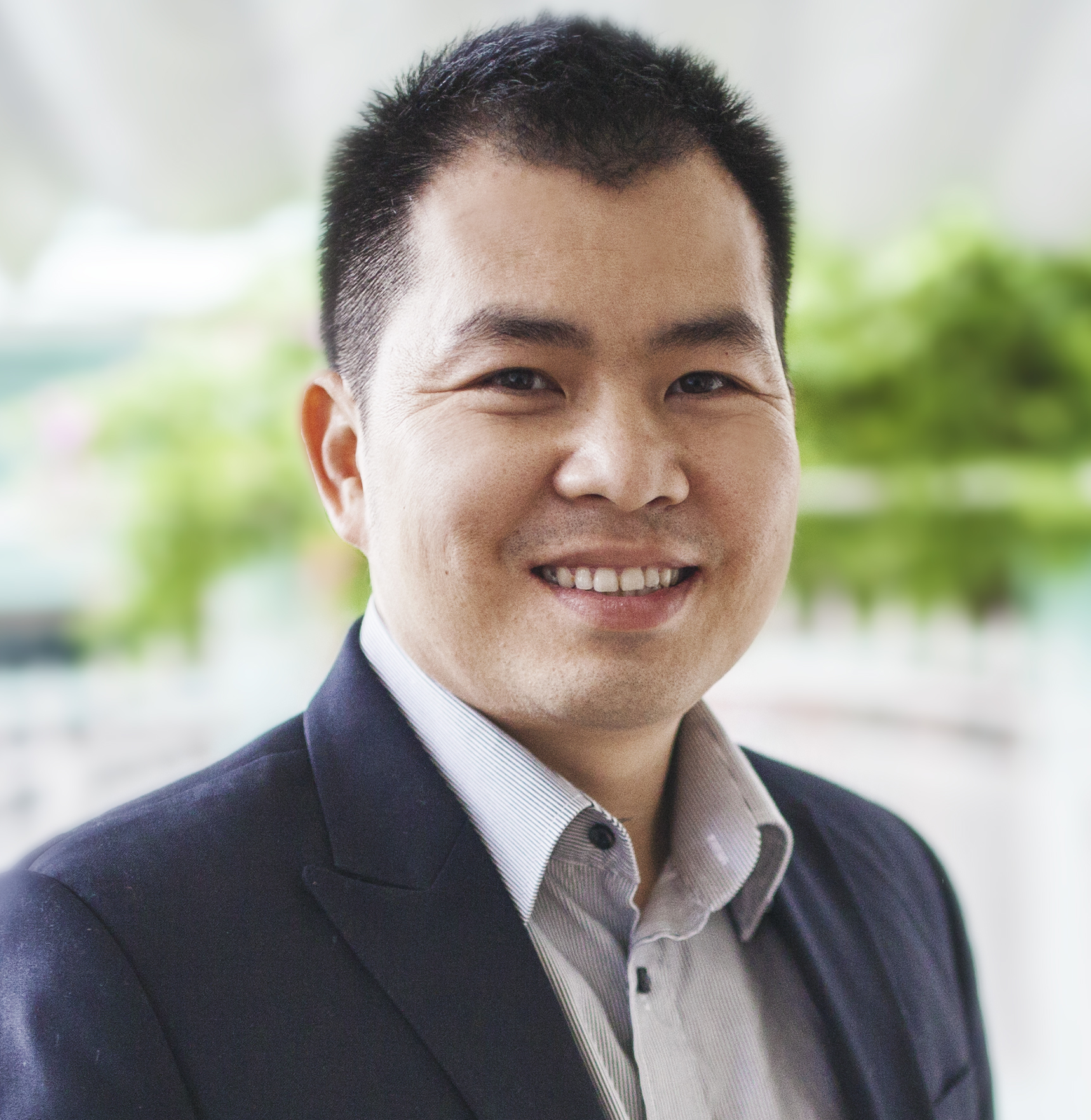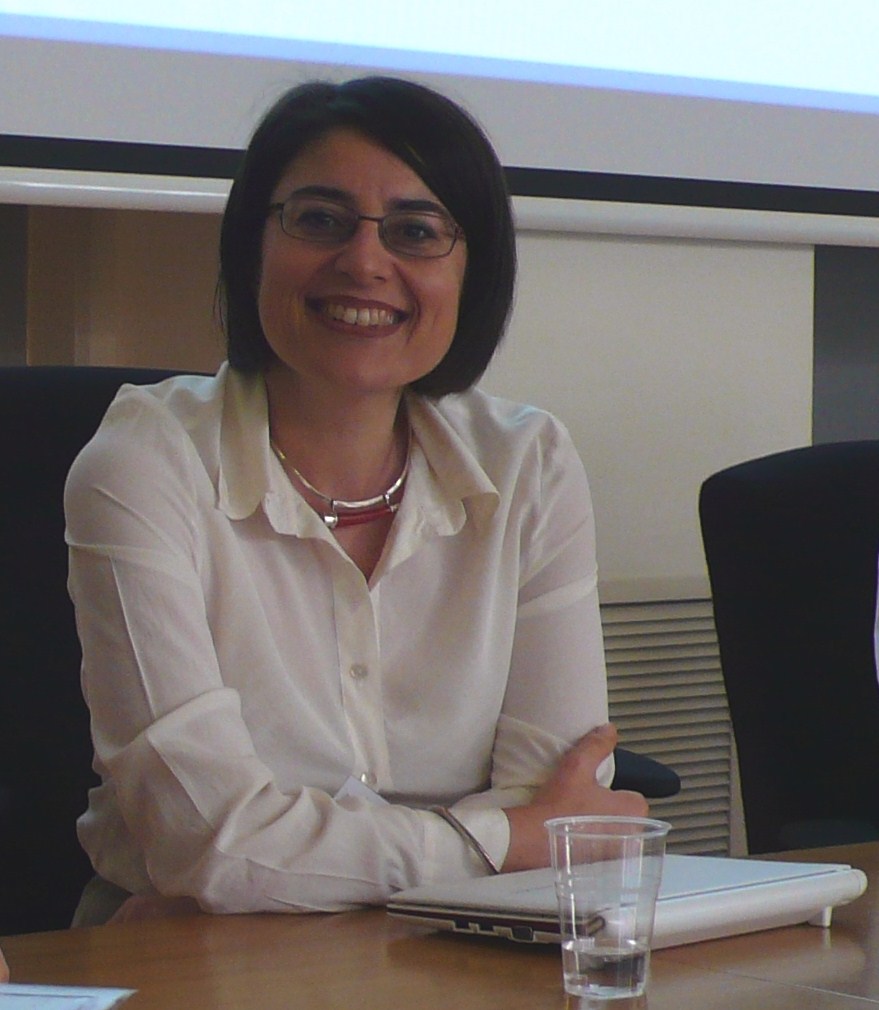


The LDAC workshop series provides a focused overview on technical and applied research on the usage of semantic web, linked data and web of data technologies for architecture and construction (design, engineering, construction, operation, etc.). The workshop aims at gathering researchers, industry stakeholders, and standardization bodies of the broader Linked Building Data (LBD) community. The aim of the workshop is to present current developments, coordinate efforts, gather stakeholders, and elaborate practical insights from industry.
The workshop series has taken place yearly since 2012 in many locations and venues, often collocated, often stand-alone. The workshop gathers domain experts from the architecture, engineering, and construction (AEC) domain as well as computer scientists and software developers that are close to the use of (semantic) web technologies. The workshop is open to industry participation.
In 2023, the workshop will again be organised as a fully stand-alone event, in combination with a summer school and in one single location in Italy, namely Matera. As in the past years, the workshop covers work from three perspectives: research, technical discussions and industry developments. In short, LDAC welcomes stakeholders from research and practice and serves as a common communication platform to advance and innovate the use of linked data in architecture and construction.

LDAC aims at providing a forum for technical discussion on the topic of handling data in architecture and construction. A large part of the workshop is concerned with the use of (semantic) web technologies. Research is welcomed on the use of ontologies and vocabularies for representing building data, 3D geometry, product data, geospatial data, infrastructure data, HVAC data, sensor data, and so forth.
Additionally, the workshop welcomes work on how to combine these highly semantic datasets with other data sets, which in the case of architecture and construction consist mainly of geometry and sensor data streams. Using different data storage techniques (semantic data stores, time series databases, key-value stores), the purpose of the LDAC workshop is to investigate ways in which data can be combined into a complete and holistic set of available building data. Practical techniques of combining datasets in the current web-based and data-driven world are explored: Internet of Things, Machine Learning, Digital Twins, Building Information Modelling.
Finally, and most importantly, a number of industry cases are invited, presenting interesting ideas, use cases, solutions or experience reports related to practical applications at any stage of construction lifecycle (design, construction, operations, facility management, renovation). Both success stories and discussions of obstacles in the way of adoption of presented technologies are welcome.
The workshop topics include, but are not restricted to the following:
Danh Le Phuoc is a pioneer in the area of semantic stream processing and reasoning. He built some first systems in RDF stream middleware and processing which won various awards in the Semantic Web community, e.g, honorable test-time award and Semantic Web Challenge. He is also known for his work as a co-editor of the W3C/OGC standard, Semantic Sensor Network Ontology. These systems and standards have been used in various EU, Irish and German projects, e.g COSMO, SMARTER, SMARTEDGE and AIoTwin. Among them, he is the technical coordinator of the EU Horizon project, SMARTEDGE (https://www.smart-edge.eu/), with 15 partners to build emerging cooperative systems such as collaborative robots in Dell and Siemens factories and V2I and I2V systems. He is currently a research group leader at Berlin Institute for Foundation for Data and Learning (bifold.berlin) at TU Berlin where he is leading the research lab, ‘Pervasive Intelligence and Computing’, PICOM (https://picom.ai/). The research interests of PICOM Lab are around the intersection of knowledge graph, neural-symbolic AI and pervasive computing with the applications for autonomous vehicles, robotics and industrial IoT. Besides, he is also a senior scientist at Fraunhofer FOKUS.
Francesca A. Lisi, PhD holder in Artificial Intelligence (AI), is currently an Associate Professor of Computer Science at the University of Bari "Aldo Moro" (Italy), where she teaches "Database Design" to undergraduate students and "Knowledge Representation and Reasoning" to graduate students. Since her PhD studies, Francesca’s research has been characterized by the cross-fertilization of results obtained in different areas inside AI and also outside AI, notably in Databases. Francesca serves as PC member in major international AI conferences such as IJCAI, AAAI and ECAI. She has organized several scientific events, also at the international level. In particular, she was co-organizer and PC co-chair of the IAOA Design Semantics SIG workshop on "Ontologies, Inference and Standards for Spatial Design" (DesignSemantics 2014) and of the 1st Workshop on Artificial Intelligence and Design (AIDE 2015). Since 2013 Francesca is elected member of the Executive Board of the Italian Association for Artificial Intelligence (AIxIA). Partly under the patronage of AIxIA, she is active in dissemination of AI-related scientific knowledge, by organizing or participating in public events.
You can register for workshop only, summer school only, or the full package. Early bird registration ends on 31st March, and regular registration starts on 1st April. The following registration options are provided:
The registration for the Summer School is subject to approval by the Organizing Committee. If you register for the Summer School, please wait for the feedback before registering for the Workshop. Important: the summer school has sold out; all seats are taken. No further registration is possible. Participants of the summer school can still register for the workshop.
The LDAC 2023 workshop is organised as a two-day plenary event. This includes keynote presentations, plenary research paper sessions, and an industry track on Thursday afternoon. Also a late-breaking works session is included on Friday. Papers of the plenary sessions are peer-reviewed by the Program Committee. All papers are published as part of a separate volume of the CEUR-WS proceedings, namely Volume 3633, including full papers, short papers, and industry abstracts all in one volume.
The sessions in the main conference room can be followed using a Live Stream in Teams. This is a one-directional broadcast only. The recordings will remain available online for later viewing. All relevant links can be found in the LDAC Summer School program below.


As part of the workshop, we invite companies to present interesting cases, innovation, research, and development related to Linked Data in Architecture and Construction. We therefore invite you to submit your industry case, presenting an interesting idea, a use case, solution or your general experience reports related to practical applications of linked data at any stage of the construction lifecycle (design, construction, operations, facility management, retrofitting). Both success stories and discussions of obstacles in the way of adoption of presented technologies are welcome. Accepted submissions are presented and discussed in the plenary industry track session(s) during the workshop.
The submission system for the Industry Track is now closed.
This year, there will again be an LDAC Summer School, directly preceding the workshop, and in the same location. The Summer School of LDAC will be organised 12-14 June, in Matera, Italy. This Summer School focuses entirely on the use of linked data and semantic web technologies for the built environment. In this summer school, experts and researchers in the use of these technologies for the AEC industry will share their knowledge and expertise to a limited audience of 40 participants.
The summer school targets starting PhD students and starting industry professionals within the AEC industry. Coding experience is highly recommended.
All seats in the summer school are taken. Application and registration for the summer school is now closed.

Group picture from SSoLDAC2022
The LDAC Summer School and Workshop will take place in Casa delle Tecnologie Emergenti (CTE) in Matera, Italy. CTE Matera is a local center of technological innovation and emerging technologies, such as Blockchain, Artificial Intelligence (AI), Internet of Things (IoT). The CTE Matera is set up and supported by Università della Basilicata, Politecnico di Bari and Consiglio Nazionale delle Ricerche (CNR).
Matera is a city in the region of Basilicata, in Southern Italy. Matera was European Capital of Culture in 2019.

Throughout the week, several social events are planned, both for the summer school and workshop. An overview of locations and times can be found in the below map and in the attached PDF document. While we will provide instructions and help on-site, the welcome cocktail is a place that you need to search and find for yourself.
There are multiple airports from which you can reach Matera. The nearest airport is the Karol Wojtyla airport (BRI) in Bari. There are multiple options to reach Matera from Bari. First, you can take the Pugliairbus, which departs from Bari airport multiple times a day. The estimated time of the trip is 1 hour and 15 minutes. You can also take a 20-minute train ride to Bari Centrale and take the MarinoBus to Matera, which is a 1 hour and 20 minute ride.
A second option is the Salento Airport (BDS) in Brindisi. The trip from Brindisi to Matera is a little more challenging. The easiest option is to travel to the airport of Bari first using Pugliairbus, which departs from Brindisi Airport and brings you to Bari airport in 1 hour and 40 minutes. Once arrived in Bari, you can take a second Pugliairbus to Matera, which is a 1 hour and 15 minute trip. Next to reaching Bari by bus, one can also go there by train (RV 4404 to Bari Centrale), after which you can either take the MarinoBus to Matera or travel further to Bari airport by train (FR2 Corato) and take the Pugliairbus.
A third option is Naples Capodichino International Airport (NAP). There is no direct connection from Naples to Matera. You can either first travel to Bari by train and take one of the options mentioned above, travel with MarinoBus (via Bari) or travel to Foggia using FlixBus and continue to Matera using MarinoBus.
Rooms (single, double with single beds, triple with single beds, double) can be booked at Casa per Ferie Sant’Anna at a discounted price of 37€ per person per night. The cost includes breakfast and local tax.
Please note that these rooms are available only for 3 nights, with check-in on 12th June and check-out on 15th June. You can book a room by writing an email and specifying the reservation code LDAC2023 by 30th April 2023.
Casa per Ferie Sant’Anna
Via Lanera, 14 – 75100 Matera (Italy)
phone: +39 0835 33 34 62
email: santanna.matera[AT]gmail.com
web: www.santannamatera.it
A bed in a hostel room can be booked at Fra i sassi residence at a discounted price of 23€ per person per night (+2€ for local tax). Breakfast is optional and costs additional 5€.
Beds are available with check-in on 11th June and check-out on 16th June, but a shorter period can be agreed. You can book a room by writing an email and specifying the reservation code Elledac 2023 by 30th April 2023.
Fra i sassi residence
via D’Addozio 102 - 75100 Matera (Italy)
phone: +39 0835 336020
email: mail[AT]fraisassiresidence.com
web: www.fraisassiresidence.com
Rooms can be booked at Albergo Italia, specifically standard double (110€ for single use or 175€ as double room, per night per person) or superior double (125€ for single use or 190€ as double room, per night per person). The cost includes breakfast. Additional cost of 2€ per night per person for local tax, only for the first 3 nights.
Rooms are available with check-in on 11th June and check-out on 16th June, but a shorter period can be agreed.
You can book a room by writing an email and specifying the reservation code LDAC2023 by 21st April 2023.
Albergo Italia
Via Domenico Ridola, 5, 75100 Matera MT
email: info[AT]albergoitalia.it
web: www.albergoitalia.com
Rooms (double, double for single use) can be booked at San Domenico's Rooms, owned by Hotel San Domenico al Piano that is a few meters distant, at a price of 120€ (+2€ for local tax) per night per person. The cost includes breakfast.
Rooms are available with check-in on 11th June and check-out on 16th June, but a shorter period can be agreed.
You can book a room by writing an email and specifying the reservation code LDAC2023 by 19th April 2023.
San Domenico's Rooms
Via Roma 28, 75100 Matera, Italy
email: info[AT]hotelsandomenico.it
web: www.hotelsandomenico.it/san-domenicos-rooms/
Registration opens: January 23, 2023
Abstract submission deadline (optional - no review): January 27, 2023
Paper submission deadline: February 10, 2023 Extended: February 28th, 2023 (23h59 Hawaii Time - GMT-10)
Industry Track submission deadline: February 20, 2023 Extended: March 31st, 2023 (23h59 Hawaii Time - GMT-10)
Notification of acceptance: March 15, 2023 Extended: March 22nd, 2023
Early-bird registration deadline: March 31, 2023 Extended: April 14th, 2023
Final paper submission: April 21, 2023
LDAC Summer School: 12-14 June 2023
LDAC Workshop: 15-16 June 2023

Scientific papers are welcome for submission in the LDAC2023 Easychair platform. Submit a paper of max. 12 pages (PDF) at https://easychair.org/my/conference?conf=ldac2023# before the submission deadline (February 10, 2023 - extended: February 28, 2023). Please follow the CEUR WS Proceedings template (Word, LaTeX) in one-column format, and make a submission directly via EasyChair in PDF. This can also be prepared using the template file in Overleaf, as mentioned in http://ceur-ws.org/Vol-XXX/.
Submissions will be peer-reviewed by the Program Committee. Accepted submissions will be published as part of a separate volume of the CEUR-WS proceedings. This does not include the industry presentations, which follow a different industry track procedure. All CEUR-WS proceedings are scopus-indexed. Previous proceedings can be found here:
For more information or questions, you can contact the organisers at ldac2023[AT]linkedbuildingdata.net.
The submission system for research papers is now closed.
All submissions are reviewed by at least two members of the Program Committee.
Local organisation is in hands of:
This year's LDAC workshop organisation (review process, communication, planning, publication) is done by:
LDAC2023 is looking for supporters and sponsors. If you are interested, then please have a look into our sponsor package with available options, and get in touch via ldac2023[AT]linkedbuildingdata.net.